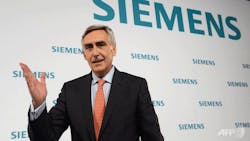Siemens Names New CEO to End Leadership Turmoil
BERLIN -- Siemens (IW 1000/34) replaced its chief executive on Wednesday in a drive to win back investor confidence hard on the heels of a profit warning.
The company said chief financial officer Joe Kaeser, 56, had been unanimously approved by the supervisory board to replace Peter Loescher after six years at the helm whose contract had been due to run another four years.
The leadership turbulence came days after the conglomerate, which makes a wide range of products from equipment for rail transport, to gas and steam turbines and generators, announced its second profit warning in two months.
In a surprise statement late on Saturday, the supervisory board revealed it would decide on the "early departure" of 55-year-old Loescher at Wednesday's long-scheduled meeting and vote on replacing him with a member of the management board.
It said after that meeting that Kaeser would kick off in his new role Thursday.
"The current CEO Peter Loescher will resign his position at the end of the day today and leave the managing board of Siemens AG by mutual consent," it said.
Kaeser said that the company was "certainly not in crisis, nor is it in need of major restructuring."
"However we've been too preoccupied with ourselves lately and have lost some of our profit momentum vis-a-vis our competitors," he said.
"My declared aim is to put Siemens back on an even keel and create a high-performance team."
Shortly after announcing the changes, the company reported a 43-percent increase in third-quarter net profit to 1.1 billion euros due to the end of some of its activities.
Even Chancellor Angela Merkel, via her spokesman, had commented on the Siemens saga, saying she viewed the group as a "flagship" of the German economy.
"Therefore it's important to her that this global company returns to calm waters," Georg Streiter told reporters on Monday.
Loescher, who came from the US pharmaceutical company Merck to take over the reins of Siemens in 2007, had faced criticism for some time amid disappointing results, a company strategy deemed vague and missed deadlines.
A Deutsche Bahn order for delivery of high-speed trains is several years behind schedule.
But last week's terse and surprise warning that it no longer expected to reach a profit margin of at least 12 percent by the 2014 business year, citing "lower market expectations", was the final straw and sparked incomprehension among investors.
It had already trimmed its full-year target in May.
Analysts at Deutsche Bank questioned last Thursday's warning, asking which markets were concerned and stressing that Siemens, which employs about 370,000 people, was active on many fronts.
Above all, the announcement underlined that a 12.0-percent margin target one of the main goals under a vast six-billion-euro ($8.0-billion) savings plan over two years, launched in late 2012, was being abandoned.
"Peter Loescher restored Siemens' high reputation and helped it achieve a series of impressive successes," chairman of the supervisory board Gerhard Cromme said in Wednesday's statement.
"Under his leadership, Siemens experienced two of the most successful years in its history."
Loescher, an Austrian, was the first Siemens chief executive recruited from outside the company. By bringing in a new face, the group hoped to draw a line under a far-reaching corruption scandal.
Kaeser, who joined the group more than three decades ago, had been his expected successor.
"An eminence grise who's stepping out from the shadows," Die Welt daily wrote of the 56-year-old, whose rise through the ranks of the Munich-based group saw him take over as financial director in 2006.
He was last year voted the best financial director of a Dax-listed company by journalists and is also known by investors.
"He knows Siemens very well and has a good reputation within the investment community," Jasko Terzic, an analyst at DZ Bank, said.
-Marie Julien, AFP
Copryright Agence France-Presse, 2013
About the Author
Agence France-Presse
Copyright Agence France-Presse, 2002-2025. AFP text, photos, graphics and logos shall not be reproduced, published, broadcast, rewritten for broadcast or publication or redistributed directly or indirectly in any medium. AFP shall not be held liable for any delays, inaccuracies, errors or omissions in any AFP content, or for any actions taken in consequence.
